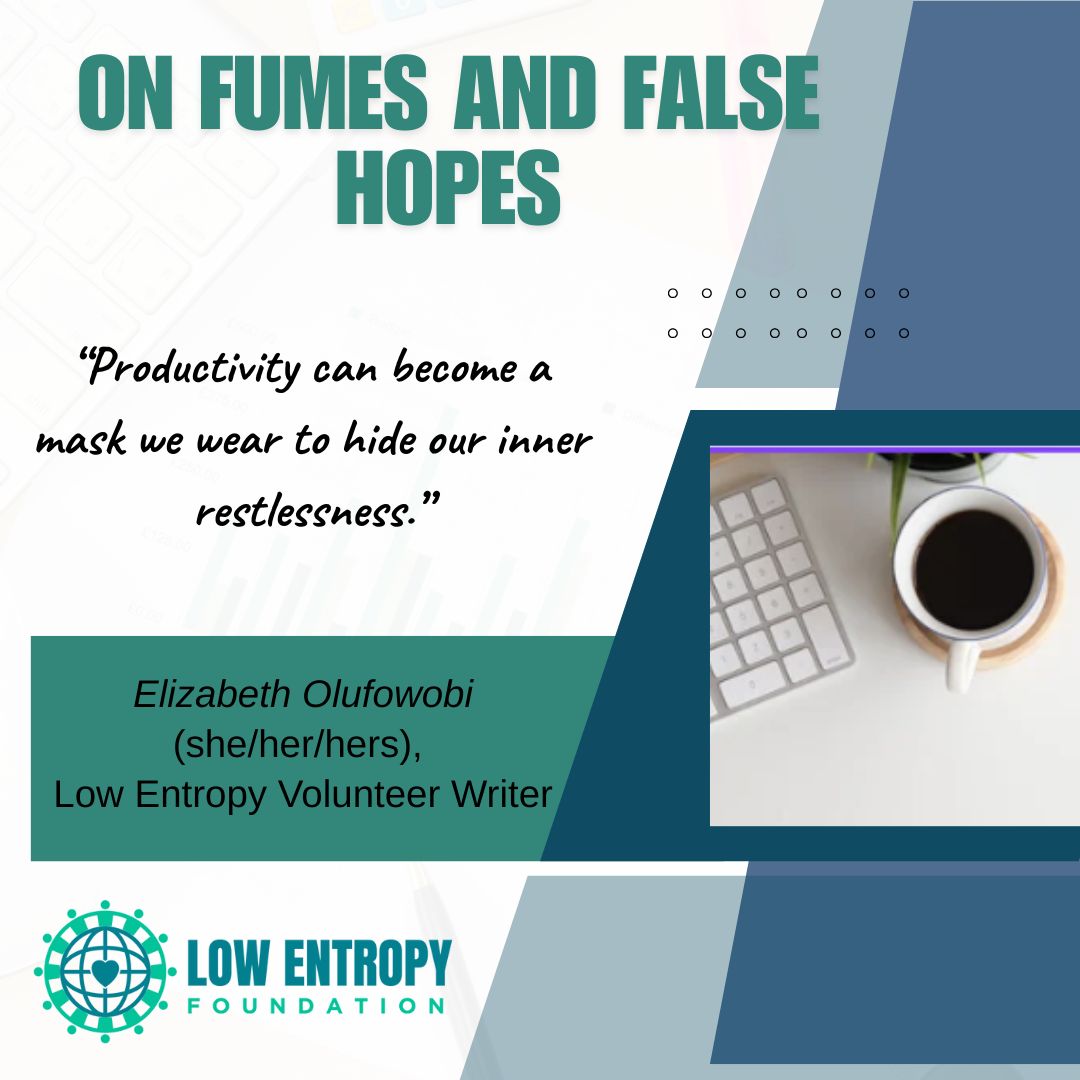Elizabeth Olufowobi (she/her/hers), Low Entropy Volunteer Writer
As an immigrant, ever since coming to Canada, I’ve felt an invisible pressure sitting heavily on my chest. It is the pressure to prove my worth. Prove that I deserve to be here. Prove that I’m not wasting the opportunities my family worked so hard to give me.
So I got busy. Volunteering. Playing sports. Signing up for anything and everything. I told myself, “There’s always something I could be doing.” Whether it was starting a blog, launching an online business, creating a program for teens, helping out at church, supporting my mother and brother . . . the list never seemed to end. And while some of these things were genuinely meaningful, I now realize that much of it was rooted in fear:
- Fear of being seen as lazy.
- Fear of being a disappointment.
- Fear that, if I slowed down, the world would move on without me.
Over time, my body and mind started to react to the pressure, both from society and myself. Anxiety crept in every night: What if I can’t finish everything on my to‑do list tomorrow? Sleep became a battleground of racing thoughts. I lost the joy I once found in writing or playing sports or volunteering, because everything became “work.” My creativity dried up, and I was burned out and tired. I started to lean in toward procrastination because it felt better to not act, for then I wouldn’t be able to fail.
But enough about me (for now, anyway—haha).
Let’s zoom out.
Productivity can become a mask we wear to hide our inner restlessness. Sometimes, we need to pause and ask ourselves, “Is this grind healthy? Am I making meaningful contributions, or just running from rest and the fear of failure?”
Busy Does Not Equal Being Purposeful
There’s a critical difference between being busy and being purposefully productive.
- Grinding out of passion feels electrifying. You lose track of time while you build, create or serve.
- Grinding from fear or letting people down ends up leaving you hollow and exhausted.
Many of us believe that more hours always equal more success. So we fill our calendars until they explode (not literally, of course), and ignore the warning signs of stress: chronic fatigue, irritability, aching muscles and mental fog. Yet research shows that, once you cross from 40 to 60 hours of weekly work, your risk of burnout doubles, and efficiency drops.
Rest, then, can become an act of rebellion in a culture that worships the hustle. Saying “no” to an extra shift or closing your laptop at 5 p.m. isn’t and shouldn’t be seen as a sign of weakness. It is self‑care. It’s reclaiming your time from systems that value output over well‑being.
The Mental Health Toll
Toxic productivity and the mentality of hustle-till-you-see-success don’t just steal your free time; they can erode your mental health. They can lead to the following:
- Anxiety & Panic: The constant “on” mentality triggers chronic stress, leaving you tense and unable to relax because you fear not reaching the “gold” at the end of the tunnel.
- Depression & Guilt: When you finally stop, guilt floods in: I should be doing more. That voice whispers that you’re not trying hard enough to deserve success.
- Insomnia & Exhaustion: Racing thoughts at bedtime make rest impossible, so you push through the next day on fumes and false hopes.
Studies link hustle culture directly to anxiety disorders, depression, and even physical health issues like heart disease and stroke (World Health Organization data shows long work hours are a major risk factor).
Eventually, some people reclaim their balance through something called quiet quitting—and despite the name, it doesn’t mean quitting your job. It means doing only what’s required, setting boundaries and refusing to let work bleed into personal time. It’s not laziness—it’s a reclaiming of control.
When Grind Is Survival
For many immigrants like me, the grind isn’t always a choice. Sometimes, it just feels like survival.
- Underemployment & Overqualification: We often work multiple jobs, outside our trained fields, just to pay the bills and create a safe home for our families.
- Cultural Expectations: Our families sacrificed everything to start over in a new country. Their hopes ride on our success. And we’re not allowed to aim for just “good”—there’s a saying among Black communities that resonates with many immigrants: You’ll have to work twice as hard to get half as far.
- Ulysses Syndrome: This term describes the chronic stress immigrants face—pressures to succeed, language barriers, isolation—that slowly chip away at well-being.
This grind, born of both necessity and pressure, can lead to high rates of depression, anxiety and identity loss. Every extra hour feels like an investment in your future—but that investment can quietly become self-exploitation.
Final Thoughts & Healthy Hustle Hacks
So is all hustling bad? No.
Can hustling be healthy? Absolutely. But a healthy hustle looks different. It looks like this:
- Setting Clear Boundaries
- Working with Intention
- Scheduling Rest
Take off that 24/7-hustle crown. Choose to rest. Build boundaries.
If you’re exhausted most days, yet afraid to stop, it’s not resilience. Rest isn’t laziness, it’s living well.
You deserve to rest, don’t you?
Sources:
- Understanding ULYSSES SYNDROME: Immigrants Chronic Stress
- Effects of overtime – Wikipedia
- Toxic Productivity is No Good—Here’s How to Stop it [2025] • Asana
- Study reveals mental health toll of underemployment among skilled immigrants | Folio
- How Quiet Quitting Could Benefit Mental Health
- Hustle Culture and Mental Health: Overcoming the Toxic Grindset at Work
—
Elizabeth Olufowobi is a deep thinker, storyteller, and community-rooted creative who’s passionate about identity, growth and honest expression. Through her writing, she hopes to remind others that imperfection is not failure, it’s freedom.

